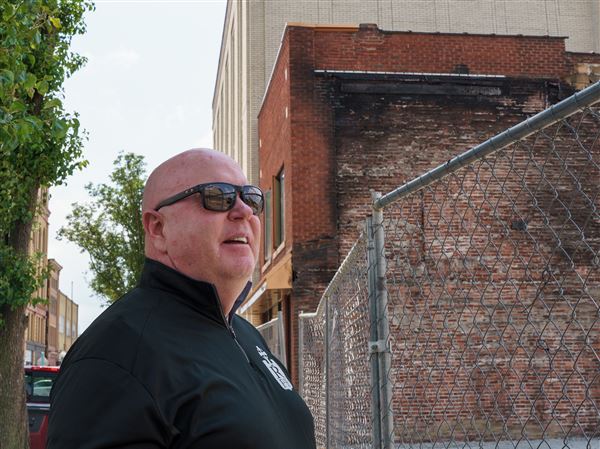Richard L. McCormick, a self-described "faculty brat" at Rutgers University who learned to swim at a campus pool on College Avenue in New Brunswick, N.J., and grew up to become the university president, announced on Tuesday that he would step down from that post at the end of next year to return to teaching -- at Rutgers, of course -- and writing.
"I used to be a scholar of American political history, and I fancy I can do that again," he said at a news conference.
Dr. McCormick, 63, who still recalls tagging along to campus events with his mother, an administrator, and his father, a history professor and dean, taught at Rutgers for 16 years before leaving to become provost of the University of North Carolina at Chapel Hill and then president of the University of Washington in Seattle. Since returning to Rutgers as president in 2002, he has engineered a historic reorganization of the university, increased fund-raising and overseen new building projects and academic programs -- all during a period of painful state budget cuts.
Before he departs the presidency, Dr. McCormick said Tuesday, he plans to push ahead on the $1 billion fund-raising campaign announced last year, to work to get a bond issue to finance construction of new academic buildings and maintenance on existing ones and to move forward on a proposal to make Robert Wood Johnson Medical School part of Rutgers.
"I'm not leaving yet, and I set forth a fairly ambitious agenda for the year ahead," he said in an interview.
Greg Trevor, a Rutgers spokesman, said the university would "move quickly" to find a replacement.
People inside and outside the university credited Dr. McCormick with guiding Rutgers during a time of enormous fiscal pressures. New Jersey's largest and most prestigious public university, Rutgers now receives an annual state appropriation of about $400 million -- the same amount as in 1994, when it had 12,000 fewer students. The university anticipates 58,000 students in the fall.
"The challenges facing presidents of public institutions these days are pretty significant, and Richard McCormick rose to be that dynamic leader necessary in these tough economic times," said Pamela Lampitt, a state assemblywoman who heads the Legislature's Higher Education Committee. "He believes in Rutgers and what a great education can do for people."
Dr. McCormick's tenure was not without controversy. The athletic department, and in particular, the football program, was criticized for lavish salaries and shaky management. In 2008, a review committee that Dr. McCormick appointed accused him of being "too passive in exercising his authority" over athletics. Weeks later, he asked the athletic director to resign.
"Rutgers athletics grew very quickly and successfully, but without putting in place all the checks and balances and openness in decision-making that it should have had," he said in the interview on Tuesday. "And we fixed those things."
As football was growing, the administration demoted six other teams to club status, including men's tennis, men's and women's fencing, and men's swimming and diving. "We can't afford to run 30 intercollegiate sports," he said. "Maybe Harvard and Stanford can, but we can't, so I had to make some hard decisions."
In just the past year, he has coped with a student sit-in that lasted 36 hours and the suicide of Tyler Clementi, the freshman whose roommate is accused of using a webcam to secretly watch and stream video of Mr. Clementi's intimate encounter with a man. "There have been headlines I'd rather not have been written," Dr. McCormick said.
Perhaps his greatest legacy will be the consolidation of an unwieldy collection of colleges that, in Dr. McCormick's view, short-changed students. He abolished individual colleges, including Rutgers, Livingston and Douglass, establishing in their stead the School of Arts and Sciences, with uniform admissions standards and academic requirements.
Considerable resistance came from alumnae and students of Douglass College, one of the oldest women's schools in the United States. But the administration devised a compromise, allowing students to live in single-sex dormitories and pursue women's studies in the newly named Douglass Residential College.
"Rutgers was cobbled together with different institutions in different places -- Camden, Newark, New Brunswick -- and so every president has faced the challenge of bringing this university together," Dr. McCormick said. "We now have a unified School of Arts and Sciences and got away from a system in which there were all kinds of constraints on students -- if you live here, you can't study this. It was a system of gotchas."
But money troubles hampered his leadership. A history professor who spoke on the condition of anonymity on Tuesday, saying she did not want to alienate Dr. McCormick because he would be returning to her department full time, said that relations between the president and the faculty had become strained over the years.
"When he came in, there was a lot of optimism: it was like, 'Jersey guy comes back to lead the university to glory,' " she said. "But every time we turn around, someone is saying, 'Do more with less.' He did not cause that, but that's the climate he experienced here."
Dr. McCormick acknowledged those fiscal realities in his announcement. "Across the nation, the handwriting is on the wall, and whether you like it or not, state support for higher education has been on a two-decade-long decline," he said. "I and every president wish we could reverse that."
First Published: June 1, 2011, 4:00 a.m.














